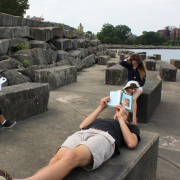As 2021 draws to a close, many are looking forward to a well-deserved winter break. It’s a great time to cozy up next to the fire with a book, so we asked University of Chicago scholars and staff what they would recommend reading.
The list includes books that weave together many different threads of human experience—family, history, science, government, nature and more—and one book that explores an intelligent robot’s experience of the human world. From the possibility of transformative justice to the prospect of nature rebounding after a crisis, there is something to match every sensibility.
Klara and the Sun, by Kazuo Ishiguro
Recommended by: Alex Ji, Assistant Professor of Astronomy and Astrophysics
“This science fiction novel tells the story of how an artificial intelligence navigates a human world. Klara is an Artificial Friend, a solar-powered robot built to provide companionship to children. I was quickly transfixed by the style of Klara’s first-person narration of the daily patterns of human and robot life, which provides an interesting perspective on both the potential and limitations of artificial intelligence. As the novel progresses, Klara's unique lens is trained on deeper questions regarding childhood illness, genetic engineering, social class, and what it means to love.”
The Book of Eels: Our Enduring Fascination with the Most Mysterious Creature in the Natural World, by Patrik Svensson
Recommended by: M. Todd Henderson, Michael J. Marks Professor of Law
“Eels are delicious. That’s about all I knew. This book opened my eyes to one of the world’s most fascinating creatures. I just couldn’t wait to tell my wife facts after every reading. (She wasn’t as keen on hearing them, especially the third or fourth time.) But you won’t be able to help yourself either. Aristotle makes an appearance, as does Freud and countless others who have tried to understand eels. No one has. No one has ever seen one breed and no one really understands them. The author alternates between chapters about eels and memoirs of he and his father fishing for eels in Sweden. The factual chapters are hugely interesting; the personal ones are deeply moving, especially for fathers with sons. You’ll like both types of chapters, even if you don’t like eels or don’t have sons.”
(Read the full list of UChicago Law School professor recommendations here.)
We Do This ‘Til We Free Us, by Mariame Kaba
Recommended by: Jen Kennedy, Director of Student Centers
“We Do This ‘Til We Free Us is a collection of interviews, articles, and a variety of previously released works by Mariame Kaba that leads the reader through an argument for the abolition of the prison-industrial complex. Kaba, an activist and educator with roots in New York City and Chicago, dives deep into the details of transformative justice and the shift in thought this would require as a society. The works are thoughtful, broad ranging, and never shy away from discussion of the gaps in current organizing. It’s a slim read but a great primer for those looking to learn more. As Mariame says, ‘Hope is a discipline.’”
1919, by Eve L. Ewing, Assistant Professor at the Crown Family School of Social Work, Policy and Practice
Recommended by: Anjali Adukia, Assistant Professor at the Harris School of Public Policy
“Eve Ewing weaves a rich tapestry of history, poetry and humanity in 1919, instigating further inquiry with an online teaching guide. Ewing connects careful multimodal research with a profound understanding of people and their narratives, culminating in a poetic dive into a dark chapter of Chicago’s history whose ripples persist through time. These vignettes, accompanied by primary source documentation, illuminate roots and tendrils of systemic and local injustices, which influence our own place and experiences—known and unknown. Beyond describing what is, 1919 also inspires the imagination to dream of what could have been and what could be.”
Berlin, by Jason Lutes
Recommended by: Angel Ysaguirre, Executive Director of Court Theatre
“This graphic novel is a wonderful combination of visual art and text, telling the story of Germany during the Weimar Republic, when the communists and fascists were vying for power. Told primarily through the lives of an artist who is new to Berlin and a journalist, this piece of work is monumental, and a pleasure to read and view.”
All That She Carried: The Journey of Ashley’s Sack, a Black Family Keepsake, by Tiya Miles
Recommended by: Rashauna Johnson, Associate Professor of History
“In this beautifully written text, renowned historian Tiya Miles retraces the story of one object—a humble, engraved sack—to weave a tale of love and care, family and history across the violent dislocations of slavery and emancipation.”
Abraham Joshua Heschel: Essential Writings
Recommended by: Rev. Dr. Maurice Charles, Dean of Rockefeller Chapel
“If the relationship between contemplation, wonder and activism interests you, I encourage you to explore Rabbi Heschel’s thought. This is the briefest collection of Heschel’s writings compiled and edited by his daughter Susannah Heschel, who teaches at Dartmouth College. Heschel is best known by his comment, ‘I felt my feet were praying,’ after he marched in Selma with Martin Luther King Jr. Descended from generations of Hasidic rabbis in Poland, Heschel was equally at home in classroom, synagogue or observing Vatican II, where he eloquently persuaded Roman Catholics to purge antisemitic tropes from their liturgies. He remains one of my favorite exemplars of someone so grounded in his identity and traditions that he can forge authentic connections with different people who share a common desire to repair the world.”
Solar Storms, by Linda Hogan
Recommended by: Gina Fedock, Assistant Professor in the Crown Family School of Social Work, Policy and Practice
“Chickasaw poet, professor and novelist Linda Hogan’s Solar Storms is a beautifully written, intergenerational saga based in land near the boundary waters of Minnesota and Canada. As the main character (Angela) and her family members resist the creation of a hydroelectric dam being developed, she finds connections across place, time and family. This book abounds with beloved characters, especially grandmothers and great-grandmothers, as well as holds narratives of pain, healing and transformation. Linda Hogan knows how to write about winter in ways that make it achingly beautiful; her talent extends to all story arcs within this gorgeous novel. Savor it!”
Islands of Abandonment: Nature Rebounding in the Post-Human Landscape, by Cal Flyn
Recommended by: Catriona MacLeod, Frank Curtis Springer and Gertrude Melcher Springer Professor of Germanic Studies
“I highly recommend Cal Flyn’s Islands of Abandonment: Nature Rebounding in the Post-Human Landscape. Flyn explores some of the most despoiled places on the planet—from Chernobyl, to the Buffer Zone in Cyprus, to the forests of Verdun, and Montserrat after its devastation by volcanic eruptions in the 1990s—and finds the signs of natural recovery in these apparently hopeless landscapes.”

